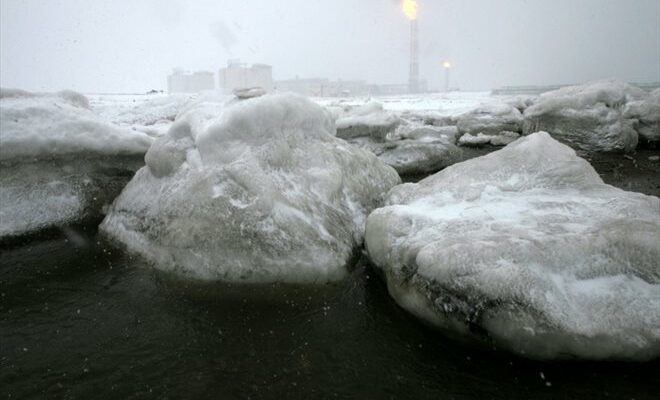A liquid natural gas LNG carrier at Sodegaura, east of Tokyo, on April 6, 20209 in Japan (JIJI PRESS/AFP/Archives/STR)
Japan, which is chairing the G7 this year, participates in international sanctions against Moscow but remains involved in Russian oil and gas projects: an energy security requirement for Tokyo, however posing problems of “vulnerability” and credibility for some experts.
On the one hand, in the wake of the invasion of Ukraine, Japan promised last year to give up Russian coal and eventually reduce its energy dependence on Moscow.
This commitment was only partially kept last year: its imports of Russian coal fell by 41.3% in volume over one year and those of oil by 56.4%. But those of liquefied natural gas (LNG) rose 4.6%, according to preliminary foreign trade figures released Thursday.
Tokyo also participates in the capping of Russian oil prices established in December by the G7, the European Union and Australia.
But Japan has exempted from this mechanism the oil it imports from Sakhalin-2, an oil and gas project off this island in the Russian Far East.
The Anglo-Saxon oil majors ExxonMobil and Shell gave up their shares in Sakhalin-1 and 2 last year and these projects have come under the tight control of the Russian state.

A liquefied natural gas plant near Korsakov on Sakhalin Island on February 17, 2009, Russia (AFP/Archives/NATALIA KOLESNIKOVA)
Tokyo, however, obtained the maintenance of its existing shares (30% of Sakhalin-1 via a public-private consortium and 22.5% of Sakhalin-2 via the private companies Mitsubishi Corp and Mitsui & Co).
These projects have the advantage of being “very close” to Japan, unlike its other sources of supply, reminds AFP Hiroshi Hashimoto of the Japanese Institute of Energy Economics (IEEJ) .
– Fragile energy security –
Japan, whose energy self-sufficiency (13.4%) is by far the lowest in the G7, has long relied on Sakhalin to diversify its supplies, knowing that more than 90% of its oil imports come from the Middle East.

A liquefied natural gas tanker near Sakhalin Island, off Korsakov, on February 16, 2009 in Russia (AFP/Archives/Natalia KOLESNIKOVA)
Its deliveries of crude could thus be threatened “in the event of a crisis in the Middle East or in the South China Sea, through which passes most of the energy bound for Japan”, explains James D. Brown, professor of the Japanese campus of American Temple University.
This precarious energy security has been “rooted in the minds of the Japanese government” since the 1970s and the first oil shock, recalls Mr. Brown.
Sakhalin-2 is even more strategic for Japan because this project supplies almost all of its Russian LNG imports (9.5% of the total volume of LNG imported by the country in 2022).
LNG prices exploded with the war in Ukraine and Europe’s rush into this segment. It would therefore have been impossible for Japan to replace its long-term contracts at Sakhalin-2 easily and cheaply, according to Yuriy Humber, founder of the Japan NRG analysis platform.
According to him, sanctioning the oil but not the natural gas of this project would not have made sense either because the extraction of these two resources is simultaneous there.
Japan also underlined the risk of seeing China replace it in Sakhalin if it gave up its shares.
– Morality vs pragmatism –
Some experts, however, doubt that Tokyo made the right choice.
Sakhalin is “a source of vulnerability” for Japan because it exposes it to potential energy retaliation from Moscow, Brown said.

A liquefied natural gas plant near Korsakov, on the island of Sakhaliine, on February 16, 2009 in Russia (AFP/Archives/Natalia KOLESNIKOVA)
“It is of course important not to depend too much” on Sakhalin, admits Mr. Hashimoto. “Japan must prepare for unfriendly events by further diversifying its supplies.”
Japanese firms recently concluded new long-term LNG contracts with the United States and Oman. But in this kind of agreements, it is generally necessary to wait several years before being delivered.
Staying in Sakhalin “undermines the moral and values-based diplomacy that (Japan) has pledged to strengthen during its presidency” of the G7, criticizes Wrenn Yennie Lindgren, an expert from the Norwegian and Swedish institutes of international affairs .
However for Mr. Humber, “we can only afford to act morally if we have a pragmatic solution” behind it. What Japan lacks in the immediate future.
And its Western allies would be in no position to give it lessons, exceptions in the oil sanctions against Russia having also been arranged for certain countries in the South-East of the European Union.
© 2023 AFP
Did you like this article ? Share it with your friends with the buttons below.




